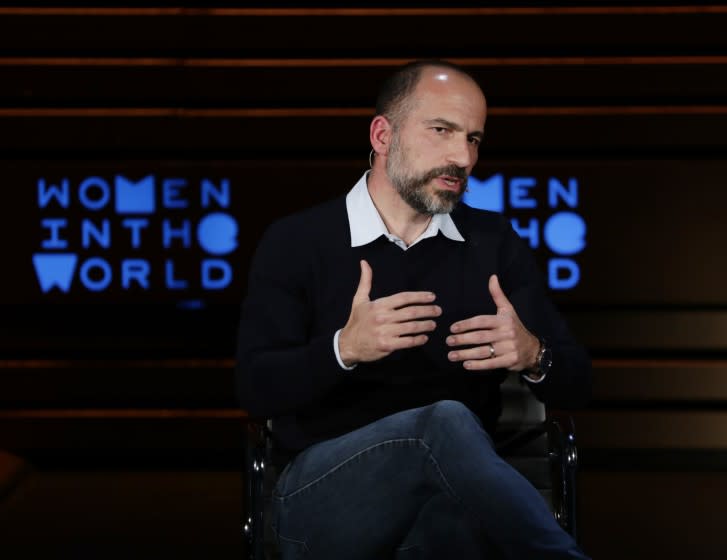News Analysis: Uber and Lyft might halt California operations over a labor fight. That may help them in November

Uber and Lyft warned they might temporarily shut down their services in California in response to a court ruling forcing them to start treating drivers in the state as employees.
A brief closure might seem like a drastic move, but it's not exactly surprising. In fact, such a shutdown could prove to be a means for Uber and Lyft to appeal to voters — both riders and drivers alike — in the run-up to a crucial vote on the November ballot.
Proposition 22, a ballot measure backed by Uber, Lyft, DoorDash and other gig economy companies, aims to exempt the companies from Assembly Bill 5, a state law that took effect this year and sets stricter standards for companies that seek to treat workers as contractors.
The companies have argued that AB 5 in its current form would raise their operating costs, because treating drivers as employees would mean providing benefits such as healthcare coverage, a minimum wage and workers' compensation. They also argue it would force them to completely restructure their businesses and limit their services by requiring drivers to work specific shifts and fixed schedules.
Proponents of AB 5 and its author, Assemblywoman Lorena Gonzalez (D-San Diego), insist the law in no way mandates that and allows employment to be as flexible as companies want.
Vital to both sides ahead of election day: convincing voters their interpretation of the law is correct.
In threatening a California shutdown in response to San Francisco Superior Court Judge Ethan Schulman's preliminary injunction over worker classification, Uber and Lyft might have found a way to show, not simply tell, drivers and riders what they imagine the service would look like if Proposition 22 fails.
In past regulatory battles, Uber has simulated in its app what it says would be the practical effects of proposed laws or regulations. In 2015, the company rolled out a "De Blasio option" in response to New York City Mayor Bill de Blasio's proposal of a cap on all for-hire vehicles as part of a full-fledged campaign to defeat the proposal — a campaign that proved successful that year. The option showed riders 25-minute wait times for rides.
Uber fought AB 5 before its passage and has continued to insist that the company is a technology platform that links passengers and drivers, not a taxi service that employs those behind the wheel. Since the law took effect, Uber has largely focused its efforts on the $110-million Proposition 22 campaign and appealing directly to drivers about their desire for flexible schedules and other perks of being a contractor.
Although a court-ordered reclassification is not exactly a welcome change, a short-term shutdown and return as a more expensive, “much smaller service," as Uber Chief Executive Dara Khosrowshahi described it in an MSNBC interview, could mobilize consumers.
Such methods helped Uber in its early days, when the service debuted in cities without regulatory approval and won over consumers, who would later sign petitions in favor of the company and advocate for it at public hearings.
"When over 3 million Californians are without a job, our elected leaders should be focused on creating work, not trying to shut down an entire industry during an economic depression," Uber spokesman Davis White said in a statement.
Although many city and state regulators have been clear that Uber is in violation of AB 5, the law has been divisive among workers in and outside of the gig economy. Some complain they've lost access to income because some companies are no longer willing to work with contractors in California for fear of violating AB 5. Many gig workers say without AB 5 they are wrongly deprived of employee benefits such as workers’ compensation and a minimum wage.
The companies have until Aug. 20 to appeal before the injunction takes effect.
That means, unless Uber or Lyft succeeds in appealing the ruling or — as Instacart did in San Diego — gets the court to pause any enforcement while the company appeals, two of California's most prominent tech companies will soon need to reclassify their vast workforces in the state.
The companies say that could take some time.
Uber initially said it might take until November to restructure its workforce but later cautioned the process could stretch more than a year.
That's because both companies' business models hinge on contract labor — an approach that saves them costs. That's especially important at a time when Uber and Lyft's primary service, passenger transport, is taking a beating from the COVID-19 pandemic's widespread effects. In quarterly earnings posted Wednesday, Lyft reported a 61% drop in revenue. Uber's total revenue, bolstered in part by food delivery, fell by 29%.
In a motion Uber filed in response to Schulman's preliminary injunction Monday, the company said it will have to "fundamentally restructure its business. And that cannot be done overnight. In fact, Uber will almost certainly have no choice but to shut down the Rides platform completely in California for a minimum of several months."
"If Uber’s Rides platform emerges from the restructuring, it will be a very different app," the motion continues.
But Schulman argued the company had two years to make changes after the state Supreme Court established a stricter test to determine whether a worker is a contractor or an employee.
"While they undoubtedly will incur costs in order to restructure their business, the costs are only those required in order to bring their business into compliance with California law," Schulman said in Monday's order.


